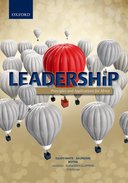
-
R 0.00
- EMAIL US
- OUT OF STOCK
- Download Catalogue

Leadership is an increasingly important concept which is being heralded as a necessary topic to be included in undergraduate courses at South African institutions, given the dearth of leadership skill displayed in especially the public sector. Leadership is a subject which should be approached in a holistic manner, particularly within the Economic and Management Sciences. The purpose of this textbook is to identify the principles of leadership in contemporary business organisations and to develop the students understanding of the interrelatedness of leadership and management in order to achieve organisational goals. The textbook also covers contemporary issues in practicing leadership for success. The book aims to encourage students to understand the principles and the importance of effective leadership in modern organisations, to understand the leadership skills that are necessary in modern organisations, the role of leaders in workplace relations and teamwork, the importance of lea d ership ethics and the formulation of leadership standards and evaluation of leadership performance.

The specification in this catalogue, including without limitation price, format, extent, number of illustrations, and month of publication, was as accurate as possible at the time the catalogue was compiled. Due to contractual restrictions, we reserve the right not to supply certain territories.